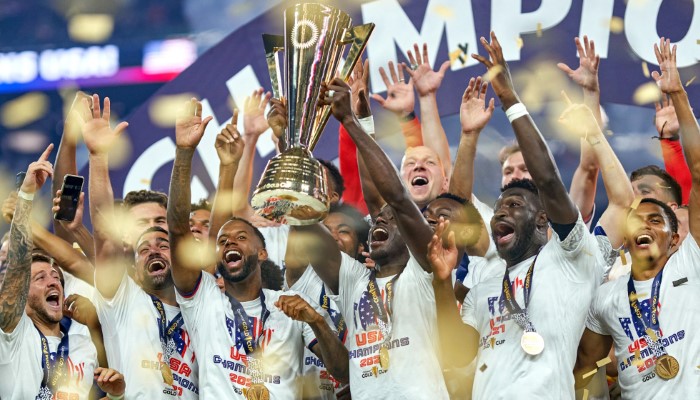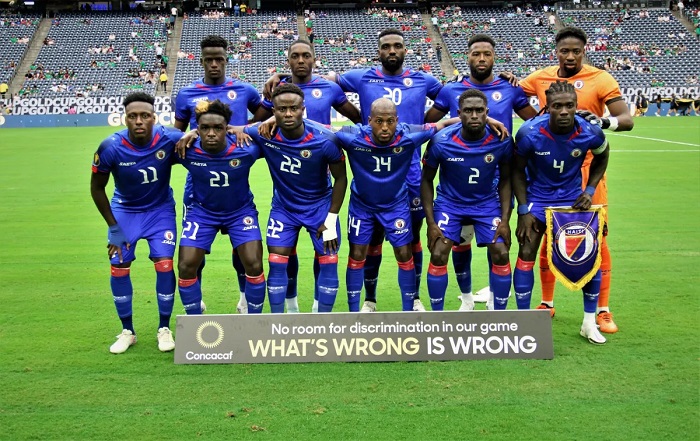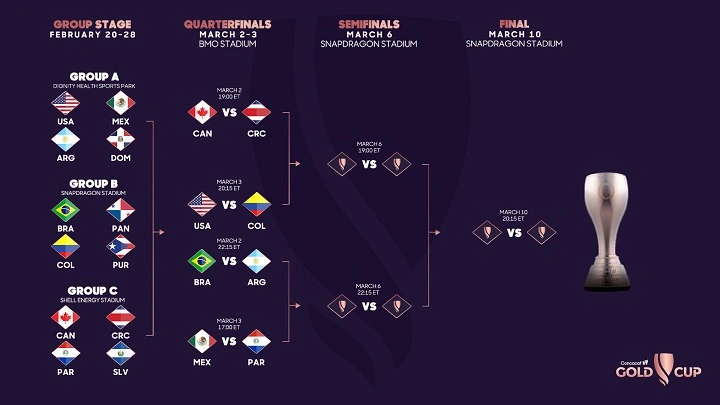The CONCACAF Gold Cup is the premier football competition in North and Central America and the Caribbean, showcasing the best national teams from the region. Held every two years, this tournament is a celebration of footballing talent, cultural pride, and regional rivalry. In this comprehensive guide, we’ll delve into the history, structure, notable moments, and the significance of the Gold Cup, providing a detailed overview of this prestigious competition.
History of the CONCACAF Gold Cup

Early Beginnings
The origins of the Gold Cup can be traced back to the CONCACAF Championship, which was first held in 1963. This competition served as the precursor to the modern Gold Cup and was established to determine the regional champion among the member nations of the Confederation of North, Central America, and Caribbean Association Football (CONCACAF).
- 1963: The inaugural CONCACAF Championship was held in El Salvador. Costa Rica emerged as the first champions.
- 1973: The competition also doubled as a qualifier for the FIFA World Cup, adding more significance to the matches.
Transition to the Gold Cup
In 1991, the CONCACAF Championship was rebranded as the CONCACAF Gold Cup. The format was revamped, and the competition began to be held biennially. The United States hosted the first edition under the new name, setting the stage for a more commercially successful and widely followed tournament.
- 1991: The United States hosted and won the first Gold Cup, defeating Honduras in a penalty shootout.
- 1996: The tournament was expanded to include teams from other confederations, such as Brazil and Colombia, as guest teams, adding an international flavor to the competition.
Structure and Format of the Gold Cup
Qualification Process
The qualification process for the Gold Cup involves a series of regional tournaments and playoffs, ensuring that the best teams from North America, Central America, and the Caribbean get a chance to compete.
- North America: Teams like the United States, Mexico, and Canada typically qualify automatically due to their strong footballing history and performance.
- Central America: The Central American Cup, organized by the Central American Football Union (UNCAF), determines the qualifiers from this sub-region.
- Caribbean: The Caribbean Cup, organized by the Caribbean Football Union (CFU), decides the teams from the Caribbean islands that will participate in the Gold Cup.
Tournament Format
The Gold Cup usually features 16 teams divided into four groups. Each group plays a round-robin format, with the top two teams from each group advancing to the knockout stages.
- Group Stage: Four groups of four teams each, where each team plays three matches.
- Quarterfinals: The top eight teams from the group stage compete in single-elimination matches.
- Semifinals: The four winners from the quarterfinals move on to this stage.
- Final: The two semifinal winners compete for the Gold Cup title.
Notable Moments in Gold Cup History
Historic Matches
The Gold Cup has seen numerous memorable matches that have left an indelible mark on the tournament’s history.
- 1991 Final: The United States vs. Honduras final ended in a 0-0 draw, leading to a penalty shootout that the U.S. won 4-3, marking their first Gold Cup victory.
- 2000 Final: Canada stunned the football world by winning their first Gold Cup, defeating Colombia 2-0 in the final.
- 2011 Final: One of the most thrilling finals saw Mexico come from behind to beat the United States 4-2, with Giovani dos Santos scoring a spectacular goal.
Legendary Players
Several players have etched their names into Gold Cup folklore with their extraordinary performances.
- Landon Donovan (USA): The all-time top scorer in Gold Cup history, Donovan’s impact on the tournament is unmatched.
- Luis Roberto Alves (Mexico): Known as Zague, he holds the record for most goals in a single tournament, scoring 11 goals in 1993.
- Rafael Márquez (Mexico): A stalwart in defense, Márquez’s leadership and consistency have been pivotal for Mexico in multiple editions.
The Significance of the Gold Cup

Regional Pride
The Gold Cup is more than just a football tournament; it is a celebration of regional pride and identity. For many countries, especially smaller nations, performing well in the Gold Cup is a source of immense national pride and can have a unifying effect.
- Cultural Showcases: The tournament provides an opportunity for countries to showcase their culture and traditions on an international stage.
- Youth Development: Success in the Gold Cup can inspire future generations and contribute to the development of football in the region.
Economic Impact
Hosting and participating in the Gold Cup has significant economic benefits.
- Tourism Boost: Host cities experience a surge in tourism, with fans traveling to support their teams, boosting local economies.
- Sponsorship and Advertising: The tournament attracts significant sponsorship and advertising revenue, which can be reinvested into the sport.
Path to International Competitions
The Gold Cup also serves as a pathway to other international competitions, such as the FIFA Confederations Cup.
- Confederations Cup Qualification: The winner of the Gold Cup often earns a spot in the Confederations Cup, providing valuable international exposure and experience.
Recent Trends and Developments
Expansion and Inclusion
The Gold Cup has continually evolved to become more inclusive and expansive.
- Increase in Teams: The tournament has expanded from 12 to 16 teams, allowing more nations to participate and compete at a high level.
- VAR Implementation: The introduction of Video Assistant Referee (VAR) technology has modernized the officiating process, ensuring fairer outcomes.
Competitive Balance
The competitive landscape of the Gold Cup has seen a shift, with traditionally dominant teams facing stiff competition from emerging footballing nations.
- Rise of Central American Teams: Nations like Costa Rica and Panama have significantly improved, challenging the dominance of Mexico and the United States.
- Caribbean Surge: Teams from the Caribbean, such as Jamaica and Haiti, have also made notable progress, reaching the later stages of the tournament in recent editions.
Key Teams and Their Performances
Mexico
Mexico is the most successful team in Gold Cup history, boasting numerous titles and consistently strong performances.
- Total Titles: Mexico has won the Gold Cup a record 11 times.
- Key Players: Legends like Cuauhtémoc Blanco, Hugo Sánchez, and Rafael Márquez have all contributed to Mexico’s dominance.
United States
The United States has been a formidable force in the Gold Cup, often challenging Mexico for supremacy.
- Total Titles: The U.S. has won the Gold Cup 7 times.
- Key Players: Players like Landon Donovan, Clint Dempsey, and Michael Bradley have been instrumental in the U.S.’s success.
Canada
Canada’s Gold Cup history is highlighted by their surprise victory in 2000, showcasing their potential on the regional stage.
- Total Titles: Canada has won the Gold Cup once.
- Key Players: The likes of Dwayne De Rosario and Atiba Hutchinson have been key figures for Canada.
Emerging Teams
- Costa Rica: Consistently strong, with several deep runs in the tournament.
- Jamaica: Reached the finals in 2015 and 2017, showcasing their growing footballing prowess.
- Panama: Known for their strong defense and tactical discipline, Panama has been a tough competitor in recent editions.
Memorable Gold Cup Tournaments

1991 Gold Cup
The first edition of the Gold Cup set the tone for the future of the tournament. Hosted by the United States, it featured eight teams and saw the U.S. claim their first title by defeating Honduras in a dramatic penalty shootout.
- Final Score: USA 0-0 Honduras (4-3 on penalties)
- Key Moment: Goalkeeper Tony Meola’s heroics in the shootout.
2015 Gold Cup
2015 Gold Cup
The 2015 Gold Cup was notable for its high level of competition and unexpected results. Held across 14 cities in the United States and Canada, the tournament saw Mexico reclaim the title under controversial circumstances.
- Final Score: Mexico 3-1 Jamaica
- Key Moments:
- Quarterfinals: The quarterfinal match between Mexico and Costa Rica ended in controversy with a late, contentious penalty awarded to Mexico.
- Semifinals: Mexico’s win over Panama was also mired in controversy, with two disputed penalties.
2017 Gold Cup
The 2017 edition was significant for the competitive balance and emerging teams making strong impressions. The United States hosted the tournament and reclaimed the title after a period of Mexican dominance.
- Final Score: USA 2-1 Jamaica
- Key Moments:
- Final: Jordan Morris scored the winning goal for the United States in the 88th minute.
- Jamaica’s Performance: Jamaica’s run to the final was impressive, including a victory over Mexico in the semifinals.
2019 Gold Cup
The 2019 Gold Cup saw the introduction of a new 16-team format, making the competition more inclusive. The tournament was co-hosted by the United States, Costa Rica, and Jamaica.
- Final Score: Mexico 1-0 USA
- Key Moments:
- Expansion to 16 Teams: This allowed for more participation from across the region.
- Final: Jonathan dos Santos scored the decisive goal for Mexico.
2021 Gold Cup
Held during the COVID-19 pandemic, the 2021 Gold Cup showcased the resilience and adaptability of the teams and organizers. The tournament maintained its high level of competition despite the challenges posed by the pandemic.
- Final Score: USA 1-0 Mexico (a.e.t.)
- Key Moments:
- Final: Miles Robinson’s header in extra time secured the title for the United States.
- Qatar’s Participation: As a guest team, Qatar’s strong performance, reaching the semifinals, added an international dimension to the tournament.
Future of the Gold Cup
Expanding Horizons
The Gold Cup is poised for continued growth and evolution, with plans to further expand its reach and impact.
- Increased Participation: Future tournaments may see more teams from outside the CONCACAF region, adding to the competition’s diversity.
- Technological Advancements: Continued use of VAR and other technologies to improve the fairness and excitement of matches.
Development Initiatives
CONCACAF is focusing on development programs to raise the standard of football across the region.
- Grassroots Programs: Investments in grassroots and youth development to nurture the next generation of football talent.
- Infrastructure Improvements: Upgrading facilities and stadiums to provide better venues for international matches.
The CONCACAF Gold Cup stands as a testament to the rich footballing heritage and competitive spirit of North America, Central America, and the Caribbean. From its humble beginnings to its current status as a premier regional tournament, the Gold Cup continues to inspire and unite football fans across the region.
Whether it’s the thrilling matches, the rise of underdog teams, or the emergence of footballing legends, the Gold Cup provides a stage for unforgettable moments and remarkable achievements. As it looks to the future, the tournament promises to bring even more excitement, inclusivity, and development to the beautiful game in the region.


